
Passe-dix, also called passage in English, is a game of chance using dice.

Passe-dix, also called passage in English, is a game of chance using dice.
It was described by Charles Cotton in The Compleat Gamester (1674) thus:
Passage is a Game at dice to be played at but by two, and it is performed with three Dice. The Caster throws continually until he hath thrown Dubblets under ten, and then he is out and loseth; or Dubblets above ten, and then he passeth and wins. [1]
Andrew Steinmetz, in The Gaming Table: Its Votaries and Victims, described it at greater length but somewhat ambiguously (the results of rolling a 10 are unclear, depending on whether it wins for the bank or is a push, the house advantage is at best 0, and at worst negative):
Passe-dix is one of the, possibly the, most ancient of all games of chance, is said to have actually been made use of by the executioners at the crucifixion of our Saviour, when they parted his garments, casting lots , Matt. xxvii. 35.
It is played with three dice. There is always a banker, and the number of players is unlimited. Each gamester holds the box by turns, and the other players follow his chance; every time he throws a point under ten he, as well as the other players, loses the entire stakes, which go to the banker. Every time he throws a point above ten (or passes ten -- whence the name of the game), the banker must double the player's stakes and the stakes of all those who have risked their money on the same chance. When the game is played by many together, each gamester is banker in his turn.
In southern Germany, playing passe-dix (or "Paschen") is a New Year's Eve tradition, which dates to the Late Middle Ages.
The rules of Paschen vary, but the following account, found in the 1896 Brockhaus Konversationslexikon is typical. The banker first wagers an ante, known as the banco. The punters either place their own bets, the sum of which must equal the banco, or one punter goes alone and wagers a stake equal to the banco themselves before the banker rolls three dice. If the sum of the dice is eleven or higher, then the banker wins; if the sum is between 3 and 10, the punters win by a ratio of 1:1. It is typical for the role of the banker to pass to their right-hand neighbour on a loss. Another typical rule is that the banker must re-roll if triples of any number are rolled.
In the present, it is common for wins to be pooled, and for sweet pastries to be bought with them and eaten by the entire party. [2]
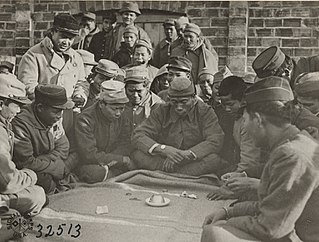
Chuck-a-luck, also known as birdcage, or sweat rag, is a game of chance played with three dice. It is derived from grand hazard and both can be considered a variant of sic bo, which is a popular casino game, although chuck-a-luck is more of a carnival game than a true casino game. The game is sometimes used as a fundraiser for charity.
Tien Gow or Tin Kau is the name of Chinese gambling games played with either a pair of dice or a set of 32 Chinese dominoes. In these games, Heaven is the top rank of the civil suit, while Nine is the top rank of the military suit. The civil suit was originally called the Chinese (華) suit while the military suit was called the barbarian (夷) suit but this was changed during the Qing dynasty to avoid offending the ruling Manchus. The highly idiosyncratic and culture-specific suit-system of these games is likely the conceptual origin of suits, an idea that later is used for playing cards. Play is counter-clockwise.

Baccarat or baccara is a card game played at casinos. It is a comparing card game played between two hands, the "player" and the "banker". Each baccarat coup has three possible outcomes: "player", "banker", and "tie". There are three popular variants of the game: punto banco, baccarat chemin de fer, and baccarat banque. In punto banco, each player's moves are forced by the cards the player is dealt. In baccarat chemin de fer and baccarat banque, by contrast, both players can make choices. The winning odds are in favour of the bank, with a house edge of at least 1 percent.
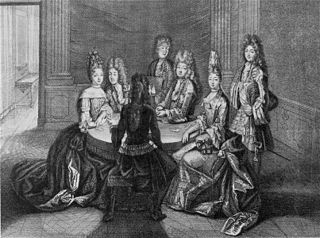
Lansquenet is a banking game played with cards, named after the French spelling of the German word Landsknecht, which refers to 15th- and 16th-century German mercenary foot soldiers; the lansquenet drum is a type of field drum used by these soldiers. It is recorded as early as 1534 by François Rabelais in Gargantua and Pantagruel.

Basset, also known as barbacole and hocca, is a gambling game using cards, that was considered one of the most polite. It was intended for persons of the highest rank because of the great losses or gains that might be accrued by players.

Hazard is an early English game played with two dice; it was mentioned in Geoffrey Chaucer's Canterbury Tales in the 14th century.

Brag is an 18th century British card game, and the British national representative of the vying or "bluffing" family of gambling games. It is a descendant of the Elizabethan game of Primero and one of the several ancestors to poker, the modern version just varying in betting style and hand rankings. It has been described as the "longest-standing British representative of the Poker family."

Cee-lo is a gambling game played with three six-sided dice. There is not one standard set of rules, but there are some constants that hold true to all sets of rules. The name comes from the Chinese Sì-Wŭ-Liù (四五六), meaning "four-five-six". In America it is also called "See-Low," "Four-Five-Six," "The Three Dice Game," "Roll-off!," and by several alternative spellings, as well as simply "Dice." In China it is also called "Sān Liù Bàozi" (三六豹子), or "Three-Six Leopards". In Japan, it is known as "Chinchiro" (チンチロ) or "Chinchirorin" (チンチロリン).

Sic bo (骰寶), also known as tai sai (大細), dai siu (大小), big and small or hi-lo, is an unequal game of chance of ancient Chinese origin played with three dice. Grand hazard and chuck-a-luck are variants, both of English origin. The literal meaning of sic bo is "precious dice", while dai siu and dai sai mean "big [or] small".

Post and Pair or Post and Pare is a gambling card game that was popular in England in the 16th and 17th centuries — another name of the game was Pink. It is based on the same three-card combinations, namely prial, found in related games of this family.

Crown and Anchor is a simple dice game, traditionally played for gambling purposes by sailors in the Royal Navy as well as those in the British merchant and fishing fleets.
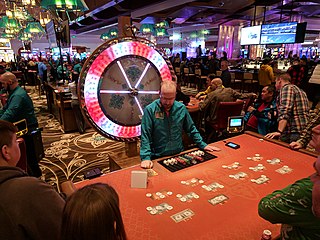
The Big Six wheel, also known simply as The Big Six, Wheel of Fortune, or The Big Wheel, is an unequal game of chance, played using a large vertical wheel that can be spun.

Monte Bank, Mountebank, Spanish Monte and Mexican Monte, sometimes just Monte, is a Spanish gambling card game and was known in the 19th century as the national card game of Mexico. It ultimately derives from basset, where the banker (dealer) pays on matching cards. The term "monte" has also been used for a variety of other gambling games, especially varieties of three-card poker, and for the swindle three-card monte.
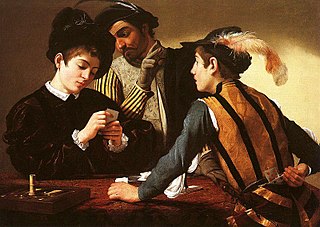
Polish Bank, Polski Pachuck, Grundehrlich, Polish Red Dog or Stitch, is a gambling game using playing cards which resembles Häufeln and Mauscheln. The game is recorded as early as 1836 in the Austro-Hungarian Empire where it was banned on the grounds of being purely a game of chance or hazard.
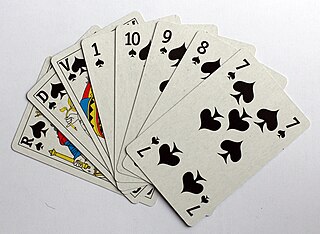
Bête, la Bête, Beste or la Beste, originally known as Homme or l'Homme, was an old, French, trick-taking card game, usually for three to five players. It was a derivative of Triomphe created by introducing the concept of bidding. Its earlier name gives away its descent from the 16th-century Spanish game of Ombre. It is the "earliest recorded multi-player version of Triomphe".

Bone-Ace or Bon Ace is an historical English gambling game using playing cards for seven or eight players that appears related to Thirty-One.

Wit and Reason is an historical English card game for two players that "seems easy at first to the learner, but in his practice and observation he will find it otherwise." It is reminiscent of Thirty-One.
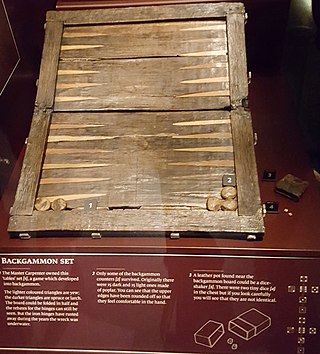
Irish or the Irish Game was an Anglo-Scottish tables game for two players that was popular from the 16th to the mid-18th centuries before being superseded by its derivative, the "faster paced" backgammon. In its day, Irish was "esteemed among the best games at Tables." Its name notwithstanding, Irish was one of the most international forms of tables games, the equivalent of French toutes tables, Italian tavole reale and Spanish todas tablas, the latter name first being used in the 1283 El Libro de los Juegos, a translation of Arabic manuscripts by the Toledo School of Translators.

Ticktack or Tick-Tack, is an historical English tables game for two players using a board similar to that used today for Backgammon and other tables games. Like its much more elaborate French counterpart, Trictrac, it has the unusual feature that there are several different ways in which it can be won, including Toots and Rovers.

Doublets or queen's game is an historical English tables game for two people which was popular in the 17th and 18th centuries. Although played on a board similar to that now used for backgammon, it is a simple game of hazard bearing little resemblance to backgammon. Very similar games were played in mainland Europe, the earliest recorded dating to the 14th century.